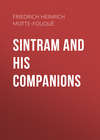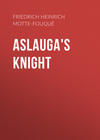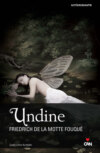Buch lesen: «Sintram and His Companions», Seite 7
CHAPTER 18
Sounds of wailing were heard from the castle as they approached; the chapel was solemnly lighted up; within it knelt Gabrielle, lamenting for the death of the Knight of Montfaucon.
But how quickly was all changed, when the noble baron, pale indeed, and bleeding, yet having escaped all mortal danger, stood smiling at the entrance of the holy building, and said, in a low, gentle voice, “Look up, Gabrielle, and be not affrighted; for, by the honour of my race, thy knight still lives.” Oh! with what joy did Gabrielle’s eyes sparkle, as she turned to her knight, and then raised them again to heaven, still streaming, but from the deep source of thankful joy! With the help of two pages, Folko knelt down beside her, and they both sanctified their happiness with a silent prayer.
When they left the chapel, the wounded knight being tenderly supported by his lady, Sintram was standing without in the darkness, himself as gloomy as the night, and, like a bird of the night, shunning the sight of men. Yet he came trembling forward into the torch-light, laid the bear’s head and claws at the feet of Gabrielle, and said, “The noble Folko of Montfaucon presents the spoils of to- day’s chase to his lady.”
The Norwegians burst forth with shouts of joyful surprise at the stranger knight, who in the very first hunting expedition had slain the most fearful and dangerous beast of their mountains.
Then Folko looked around with a smile as he said, “And now none of you must jeer at me, if I stay at home for a short time with my timid wife.”
Those who the day before had talked together in the armourer’s forge came out from the crowd, and bowing low, they replied, “Noble baron, who could have thought that there was no knightly exercise in the whole world in the which you would not show yourself far above all other men?”
“The pupil of old Sir Hugh may be somewhat trusted,” answered Folko kindly. “But now, you bold northern warriors, bestow some praises also on my deliverer, who saved me from the claws of the she-bear, when I was leaning against the rock wounded by my fall.”
He pointed to Sintram, and the general shout was again raised; and old Rolf, with tears of joy in his eyes, bent his head over his foster-son’s hand. But Sintram drew back shuddering.
“Did you but know,” said he, “whom you see before you, all your spears would be aimed at my heart; and perhaps that would be the best thing for me. But I spare the honour of my father and of his race, and for this time I will not confess. Only this much must you know, noble warriors—”
“Young man,” interrupted Folko with a reproving look, “already again so wild and fierce? I desire that thou wilt hold thy peace about thy dreaming fancies.”
Sintram was silenced for a moment; but hardly had Folko begun smilingly to move towards the steps of the castle, than he cried out, “Oh, no, no, noble wounded knight, stay yet awhile; I will serve thee in everything that thy heart can desire; but herein I cannot serve thee. Brave warriors, you must and shall know so much as this; I am no longer worthy to live under the same roof with the noble Baron of Montfaucon and his angelic wife Gabrielle. And you, my aged father, good-night; long not for me. I intend to live in the stone fortress on the Rocks of the Moon, till a change of some kind come over me.”
There was that in his way of speaking against which no one dared to set himself, not even Folko.
The wild Biorn bowed his head humbly, and said, “Do according to thy pleasure, my poor son; for I fear that thou art right.”
Then Sintram walked solemnly and silently through the castle-gate, followed by the good Rolf. Gabrielle led her exhausted lord up to their apartments.
CHAPTER 19
That was a mournful journey on which the youth and his aged foster- father went towards the Rocks of the Moon, through the wild tangled paths of the snow-clad valleys. Rolf from time to time sang some verses of hymns, in which comfort and peace were promised to the penitent sinner, and Sintram thanked him for them with looks of grateful sadness. Neither of them spoke a word else.
At length, when the dawn of day was approaching, Sintram broke silence by saying, “Who are those two sitting yonder by the frozen stream—a tall man and a little one? Their own wild hearts must have driven them also forth into the wilderness. Rolf, dost thou know them? The sight of them makes me shudder.”
“Sir,” answered the old man, “your disturbed mind deceives you. There stands a lofty fir-tree, and the old weather-beaten stump of an oak, half-covered with snow, which gives them a somewhat strange appearance. There are no men sitting yonder.”
“But, Rolf, look there! look again carefully! Now they move, they whisper together.”
“Sir, the morning breeze moves the branches, and whistles in the sharp pine-leaves and in the yellow oak-leaves, and rustles the crisp snow.”
“Rolf, now they are both coming towards us. Now they are standing before us, quite close.”
“Sir, it is we who get nearer to them as we walk on, and the setting moon throws such long giant-like shadows over the plain.”
“Good-evening!” said a hollow voice; and Sintram knew it was the crazy pilgrim, near to whom stood the malignant little Master, looking more hideous than ever.
“You are right, sir knight,” whispered Rolf, as he drew back behind Sintram, and made the Sign of the Cross on his breast and his forehead.
The bewildered youth, however, advanced towards the two figures, and said, “You have always taken wonderful pleasure in being my companions. What do you expect will come of it? And do you choose to go now with me to the stone fortress? There I will tend thee, poor pale pilgrim; and as to thee, frightful Master, most evil dwarf, I will make thee shorter by the head, to reward thee for thy deeds yesterday.”
“That would be a fine thing,” sneered the little Master; “and perhaps thou imaginest that thou wouldst be doing a great service to the whole world? And, indeed, who knows? Something might be gained by it! Only, poor wretch, thou canst not do it.”
The pilgrim meantime was waving his pale head to and fro thoughtfully, saying, “I believe truly that thou wouldst willingly have me, and I would go to thee willingly, but I may not yet. Have patience awhile; thou wilt yet surely see me come, but at a distant time; and first we must again visit thy father together, and then also thou wilt learn to call me by my right name, my poor friend.”
“Beware of disappointing me again!” said the little Master to the pilgrim in a threatening voice; but he, pointing with his long, shrivelled hand towards the sun, which was just now rising, said, “Stop either that sun or me, if thou canst!”
Then the first rays fell on the snow, and the little Master ran, muttering, down a precipice; but the pilgrim walked on in the bright beams, calmly and with great solemnity, towards a neighbouring castle on the mountain. It was not long before its chapel-bell was heard tolling for the dead.
“For Heaven’s sake,” whispered the good Rolf to his knight—“for Heaven’s sake, Sir Sintram, what kind of companions have you here? One of them cannot bear the light of God’s blessed sun, and the other has no sooner set foot in a dwelling than tidings of death wail after his track. Could he have been a murderer?”
“I do not think that,” said Sintram. “He seemed to me the best of the two. But it is a strange wilfulness of his not to come with me. Did I not invite him kindly? I believe that he can sing well, and he should have sung to me some gentle lullaby. Since my mother has lived in a cloister, no one sings lullabies to me any more.”
At this tender recollection his eyes were bedewed with tears. But he did not himself know what he had said besides, for there was wildness and confusion in his spirit. They arrived at the Rocks of the Moon, and mounted up to the stone fortress. The castellan, an old, gloomy man, the more devoted to the young knight from his dark melancholy and wild deeds, hastened to lower the drawbridge. Greetings were exchanged in silence, and in silence did Sintram enter, and those joyless gates closed with a crash behind the future recluse.
CHAPTER 20
Yes truly, a recluse, or at least something like it, did poor Sintram now become! For towards the time of the approaching Christmas festival his fearful dreams came over him, and seized him so fiercely, that all the esquires and servants fled with shrieks out of the castle, and would never venture back again. No one remained with him except Rolf and the old castellan. After a while, indeed, Sintram became calm, but he went about looking so pallid and still that he might have been taken for a wandering corpse. No comforting of the good Rolf, no devout soothing lays, were of any avail; and the castellan, with his fierce, scarred features, his head almost entirely bald from a huge sword-cut, his stubborn silence, seemed like a yet darker shadow of the miserable knight. Rolf often thought of going to summon the holy chaplain of Drontheim; but how could he have left his lord alone with the gloomy castellan, a man who at all times raised in him a secret horror? Biorn had long had this wild strange warrior in his service, and honoured him on account of his unshaken fidelity and his fearless courage, though neither the knight nor any one else knew whence the castellan came, nor, indeed, exactly who he was. Very few people knew by what name to call him; but that was the more needless, since he never entered into discourse with any one. He was the castellan of the stone fortress on the Rocks of the Moon, and nothing more.
Rolf committed his deep heartfelt cares to the merciful God, trusting that he would soon come to his aid; and the merciful God did not fail him. For on Christmas eve the bell at the drawbridge sounded, and Rolf, looking over the battlements, saw the chaplain of Drontheim standing there, with a companion indeed that surprised him,—for close beside him appeared the crazy pilgrim, and the dead men’s bones on his dark mantle shone very strangely in the glimmering starlight: but the sight of the chaplain filled the good Rolf too full of joy to leave room for any doubt in his mind; for, thought he, whoever comes with him cannot but be welcome! And so he let them both in with respectful haste, and ushered them up to the hall, where Sintram, pale and with a fixed look, was sitting under the light of one flickering lamp. Rolf was obliged to support and assist the crazy pilgrim up the stairs, for he was quite benumbed with cold.
“I bring you a greeting from your mother,” said the chaplain as he came in; and immediately a sweet smile passed over the young knight’s countenance, and its deadly pallidness gave place to a bright soft glow.
“O Heaven!” murmured he, “does then my mother yet live, and does she care to know anything about me?”
“She is endowed with a wonderful presentiment of the future,” replied the chaplain; “and all that you ought either to do or to leave undone is faithfully mirrored in various ways in her mind, during a half- waking trance. Now she knows of your deep sorrow, and she sends me, the father-confessor of her convent, to comfort you, but at the same time to warn you; for, as she affirms, and as I am also inclined to think, many strange and heavy trials lie before you.”
Sintram bowed himself towards the chaplain with his arms crossed over his breast, and said, with a gentle smile, “Much have I been favoured—more, a thousand times more, than I could have dared to hope in my best hours—by this greeting from my mother, and your visit, reverend sir; and all after falling more fearfully low than I had ever fallen before. The mercy of the Lord is great; and how heavy soever may be the weight and punishment which He may send, I trust, with His grace, to be able to bear it.”
Just then the door opened, and the castellan came in with a torch in his hand, the red glare of which made his face look the colour of blood. He cast a terrified glance at the crazy pilgrim, who had just sunk back in a swoon, and was supported on his seat and tended by Rolf; then he stared with astonishment at the chaplain, and at last murmured, “A strange meeting! I believe that the hour for confession and reconciliation is now arrived.”
“I believe so too,” replied the priest, who had heard his low whisper; “this seems to be truly a day rich in grace and peace. That poor man yonder, whom I found half-frozen by the way, would make a full confession to me at once, before he followed me to a place of shelter. Do as he has done, my dark-browed warrior, and delay not your good purpose for one instant.”
Thereupon he left the room with the willing castellan, but he turned back to say, “Sir Knight and your esquire! take good care the while of my sick charge.”
Sintram and Rolf did according to the chaplain’s desire: and when at length their cordials made the pilgrim open his eyes once again, the young knight said to him, with a friendly smile, “Seest thou? thou art come to visit me after all. Why didst thou refuse me when, a few nights ago, I asked thee so earnestly to come? Perhaps I may have spoken wildly and hastily. Did that scare thee away?”
A sudden expression of fear came over the pilgrim’s countenance; but soon he again looked up at Sintram with an air of gentle humility, saying, “O my dear, dear lord, I am most entirely devoted to you— only never speak to me of former passages between you and me. I am terrified whenever you do it. For, my lord, either I am mad and have forgotten all that is past, or that Being has met you in the wood, whom I look upon as my very powerful twin brother.”
Sintram laid his hand gently on the pilgrim’s mouth, as he answered, “Say nothing more about that matter: I most willingly promise to be silent.”
Neither he nor old Rolf could understand what appeared to them so awful in the whole matter; but both shuddered.
After a short pause the pilgrim said, “I would rather sing you a song—a soft, comforting song. Have you not a lute here?”
Rolf fetched one; and the pilgrim, half-raising himself on the couch, sang the following words:
“When death is coming near,
When thy heart shrinks in fear
And thy limbs fail,
Then raise thy hands and pray
To Him who smooths thy way
Through the dark vale.
Seest thou the eastern dawn,
Hearst thou in the red morn
The angel’s song?
Oh, lift thy drooping head,
Thou who in gloom and dread
Hast lain so long.
Death comes to set thee free;
Oh, meet him cheerily
As thy true friend,
And all thy fears shall cease,
And in eternal peace
Thy penance end.”
“Amen,” said Sintram and Rolf, folding their hands; and whilst the last chords of the lute still resounded, the chaplain and the castellan came slowly and gently into the room. “I bring a precious Christmas gift,” said the priest. “After many sad years, hope of reconciliation and peace of conscience are returning to a noble, disturbed mind. This concerns thee, beloved pilgrim; and do thou, my Sintram, with a joyful trust in God, take encouragement and example from it.”
“More than twenty years ago,” began the castellan, at a sign from the chaplain—“more than twenty years ago I was a bold shepherd, driving my flock up the mountains. A young knight followed me, whom they called Weigand the Slender. He wanted to buy of me my favourite little lamb for his fair bride, and offered me much red gold for it. I sturdily refused. Over-bold youth boiled up in us both. A stroke of his sword hurled me senseless down the precipice.
“Not killed?” asked the pilgrim in a scarce audible voice.
“I am no ghost,” replied the castellan, somewhat morosely; and then, after an earnest look from the priest, he continued, more humbly: “I recovered slowly and in solitude, with the help of remedies which were easily found by me, a shepherd, in our productive valleys. When I came back into the world, no man knew me, with my scarred face, and my now bald head. I heard a report going through the country, that on account of this deed of his, Sir Weigand the Slender had been rejected by his fair betrothed Verena, and how he had pined away, and she had wished to retire into a convent, but her father had persuaded her to marry the great knight Biorn. Then there came a fearful thirst for vengeance into my heart, and I disowned my name, and my kindred, and my home, and entered the service of the mighty Biorn, as a strange wild man, in order that Weigand the Slender should always remain a murderer, and that I might feed on his anguish. So have I fed upon it for all these long years; I have fed frightfully upon his self-imposed banishment, upon his cheerless return home, upon his madness. But to-day—” and hot tears gushed from his eyes—“but to- day God has broken the hardness of my heart; and, dear Sir Weigand, look upon yourself no more as a murderer, and say that you will forgive me, and pray for him who has done you so fearful an injury, and—”
Sobs choked his words. He fell at the feet of the pilgrim, who with tears of joy pressed him to his heart, in token of forgiveness.
CHAPTER 21
The joy of this hour passed from its first overpowering brightness to the calm, thoughtful aspect of daily life; and Weigand, now restored to health, laid aside the mantle with dead men’s bones, saying: “I had chosen for my penance to carry these fearful remains about with me, with the thought that some of them might have belonged to him whom I have murdered. Therefore I sought for them round about, in the deep beds of the mountain-torrents, and in the high nests of the eagles and vultures. And while I was searching, I sometimes—could it have been only an illusion?—seemed to meet a being who was very like myself, but far, far more powerful, and yet still paler and more haggard.”
An imploring look from Sintram stopped the flow of his words. With a gentle smile, Weigand bowed towards him, and said: “You know now all the deep, unutterably deep, sorrow which preyed upon me. My fear of you, and my yearning love for you, are no longer an enigma to your kind heart. For, dear youth, though you may be like your fearful father, you have also the kind, gentle heart of your mother; and its reflection brightens your pallid, stern features, like the glow of a morning sky, which lights up ice-covered mountains and snowy valleys with the soft radiance of joy. But, alas! how long you have lived alone amidst your fellow-creatures! and how long since you have seen your mother, my dearly-loved Sintram!”
“I feel, too, as though a spring were gushing up in the barren wilderness,” replied the youth; “and I should perchance be altogether restored, could I but keep you long with me, and weep with you, dear lord. But I have that within me which says that you will very soon be taken from me.”
“I believe, indeed,” said the pilgrim, “that my late song was very nearly my last, and that it contained a prediction full soon to be accomplished in me. But, as the soul of man is always like the thirsty ground, the more blessings God has bestowed on us, the more earnestly do we look out for new ones; so would I crave for one more before, as I hope, my blessed end. Yet, indeed, it cannot be granted me,” added he, with a faltering voice; “for I feel myself too utterly unworthy of so high a gift.”
“But it will be granted!” said the chaplain, joyfully. “‘He that humbleth himself shall be exalted;’ and I fear not to take one purified from murder to receive a farewell from the holy and forgiving countenance of Verena.”
The pilgrim stretched both his hands up towards heaven and an unspoken thanksgiving poured from his beaming eyes, and brightened the smile that played on his lips.
Sintram looked sorrowfully on the ground, and sighed gently to himself: “Alas! who would dare accompany?”
“My poor, good Sintram,” said the chaplain, in a tone of the softest kindness, “I understand thee well; but the time is not yet come. The powers of evil will again raise up their wrathful heads within thee, and Verena must check both her own and thy longing desires, until all is pure in thy spirit as in hers. Comfort thyself with the thought that God looks mercifully upon thee, and that the joy so earnestly sought for will come—if not here, most assuredly beyond the grave.”
But the pilgrim, as though awaking out of a trance, rose mightily from his seat, and said: “Do you please to come forth with me, reverend chaplain? Before the sun appears in the heavens, we could reach the convent-gates, and I should not be far from heaven.”
In vain did the chaplain and Rolf remind him of his weakness: he smiled, and said that there could be no words about it; and he girded himself, and tuned the lute which he had asked leave to take with him. His decided manner overcame all opposition, almost without words; and the chaplain had already prepared himself for the journey, when the pilgrim looked with much emotion at Sintram, who, oppressed with a strange weariness, had sunk, half-asleep, on a couch, and said: “Wait a moment. I know that he wants me to give him a soft lullaby.” The pleased smile of the youth seemed to say, Yes; and the pilgrim, touching the strings with a light hand, sang these words:
“Sleep peacefully, dear boy;
Thy mother sends the song
That whispers round thy couch,
To lull thee all night long.
In silence and afar
For thee she ever prays,
And longs once more in fondness
Upon thy face to gaze.
And when thy waking cometh,
Then in thy every deed,
In all that may betide thee,
Unto her words give heed.
Oh, listen for her voice,
If it be yea or nay;
And though temptation meet thee,
Thou shalt not miss the way.
If thou canst listen rightly,
And nobly onward go,
Then pure and gentle breezes
Around thy cheek shall blow.
Then on thy peaceful journey
Her blessing thou shalt feel,
And though from thee divided,
Her presence o’er thee steal.
O safest, sweetest comfort!
O blest and living light!
That, strong in Heaven’s power,
All terrors put to flight!
Rest quietly, sweet child,
And may the gentle numbers
Thy mother sends to thee
Waft peace unto thy slumbers.”
Sintram fell into a deep sleep, smiling, and breathing softly. Rolf and the castellan remained by his bed, whilst the two travellers pursued their way in the quiet starlight.














